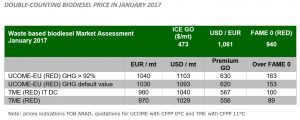Week 49: Overview of the world biodiesel market
Biodiesel Markets:
- Donald Trump nominated Scott Pruitt as Environmental Protection Agency (EPA) Administrator. Mr Pruitt is known to be a climate sceptic and question the impact of human activity on global warming.
- The bio industry welcomed with cautiousness the nomination of Mr Pruitt and a lot of uncertainties remain regarding the renewable energies policies. Markets reacted negatively with soybean oil down by around 3% on CBOT markets day-on-day.
- Esterifrance, the union of French biofuels producers, harshly criticized the EU Commission’s decision to cut by half the share of the 1st generation biofuel in the transport sector. In France, the share could be reduced from 7% to 3.8% by 2030 which threatens both biofuels and agriculture industries as well as the national energy independence.
- According to the USDA, US biofuels imports rose by 1.5% in October to around 254 KT. Imports from Argentina raised by almost 40% month-on-month. Argentina remains, by far, the main supplying country followed by Indonesia and Canada.
- The biodiesel feedstock prices eased on weaker veg-oil prices starting Wednesday 07/12. We observed market corrections after soybean oil, palm-oil and rapeseed oil reached their highest level in several months putting waste-based feedstock under pressure.

ECB press conference
- ECB Chairman Mario Draghi announced on Thursday 8th December that the central bank policy rate will remain unchanged and that the bond purchases will continue until December 2017, however, at a slower pace.
- The European currency fell by around 1,33% to 1.0622 dollars on a more accommodating monetary policy than expected.
- Overall, markets resisted well the recent political events (Brexit, Trump election, Italy referendum, etc.) which could be explained by the steadiness of regulatory policies and the programme of asset purchase maintained at 60 billion euros.
Oil Markets
- Brent prices maintained their level at above $50 per barrel after the OPEC announcement to reduce crude output by 1.2 million barrels per day (bpd) in the first half of 2017. On Thursday, Brent increased by 0.66% to $53.35 a barrel and WTI increased by 0.8% to $50.17 a barrel.
- Oil producing countries will meet again this weekend in Vienna to see if countries outside of OPEC will join the decision to cap global production. Russia already declared its readiness to reduce output by 300 K barrels per day.
- Chinese crude oil imports are expected to raise for the second year in a row after an increase of 900 K barrel per day last year. The demand from Chinese independent refineries will keep growing on slightly higher import quotas set by the government.
